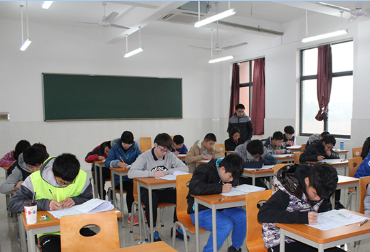 返回
教育头条
返回
教育头条

高中英语语法It的用法总结
(一)作人称代词1、it代替前面(或后面)的单数名词或分句等所表示的事物。
e.g. You cannot eat your cake but have it.(it代替前面的cake)
Although we cannot see it, there is air all around us.(it代替后面的air)
They say he has left town, but I don’t believe it.(it代替前面They…town分句中的情况)
2、代替有生命但不能或不必分阴阳性的东西(包括婴儿)。
e.g. Yesterday we saw a big tree. It was fully twenty metres high.(it代替前面的tree)
The baby cried because it was hungry.(it代替前面的baby)
3、在某些习惯说法中,可以代替人。
e.g. ---- Someone is knocking at the door, Peter.
---- Who is it?
---- It’s me.
---- Who are singing?
---- It is the children.
---- The light is still on in the lab. It must be the third-year students doing the experiment.
4、it与one的区别:这两个词都可以代表前面说过的名词,但it用于同名同物的场合;one则用于同名异物的场合。
e.g. ---- Do you still have the bicycle?
---- No, I have soldit.
---- Is this knife yours?
---- No. It is Xiao Zhang’s. Mine is theoneon the desk.
5、it与that的区别:两词都可代替某一特定名词,但that指同一类,并非同一个。
e.g. The climate of South China is mild(温和的); I likeitvery much.(it指the climate of South China)
The climate of South China is much better thanthatof Japan.(that指the climate)

(二)作无人称代词
it作无人称代词时,除了句中找不到它所代表的词语外,另一个特点是它后面的内容都是表示天气、时间、距离、度量衡及情况等。
It is fine (rainy, windy, etc.).
It is noon.
It is a half hour’s walk to the factory.
It is eighteen square metres in area.
What does it matter?
(三)作强调词,构成强调结构
用以帮助改变句子结构,使句子的某一成分受到强调。“It is (was) 所强调的成分 that (who) 其它成分。”在这个句型中,it本身没有词义。详见“一、强调句”。
(四)引导词it作形式主语(宾语)
为了使句子平衡,常采用形式主语(或宾语)it,而把真正的主语(或宾语)置于句子后面。通常引导词it与它所代替的句子成分中间要夹有某些词。
e.g. It takes half an hour to go there on foot.(It与to go there on foot之间夹有takes half an hour四个词)
We thought it strange that Mr Smith did not come last night.(it与that从句中间夹有strange)
但有时it与所替代部分之间并不夹有其它词。
e.g. You may depend on it that they will support you.(因为介词on之后一般不直接接that引导的宾语从句。注意:it不是多余的,不能当作错句)
e.g. You cannot eat your cake but have it.(it代替前面的cake)
Although we cannot see it, there is air all around us.(it代替后面的air)
They say he has left town, but I don’t believe it.(it代替前面They…town分句中的情况)
2、代替有生命但不能或不必分阴阳性的东西(包括婴儿)。
e.g. Yesterday we saw a big tree. It was fully twenty metres high.(it代替前面的tree)
The baby cried because it was hungry.(it代替前面的baby)
3、在某些习惯说法中,可以代替人。
e.g. ---- Someone is knocking at the door, Peter.
---- Who is it?
---- It’s me.
---- Who are singing?
---- It is the children.
---- The light is still on in the lab. It must be the third-year students doing the experiment.
4、it与one的区别:这两个词都可以代表前面说过的名词,但it用于同名同物的场合;one则用于同名异物的场合。
e.g. ---- Do you still have the bicycle?
---- No, I have soldit.
---- Is this knife yours?
---- No. It is Xiao Zhang’s. Mine is theoneon the desk.
5、it与that的区别:两词都可代替某一特定名词,但that指同一类,并非同一个。
e.g. The climate of South China is mild(温和的); I likeitvery much.(it指the climate of South China)
The climate of South China is much better thanthatof Japan.(that指the climate)

(二)作无人称代词
it作无人称代词时,除了句中找不到它所代表的词语外,另一个特点是它后面的内容都是表示天气、时间、距离、度量衡及情况等。
It is fine (rainy, windy, etc.).
It is noon.
It is a half hour’s walk to the factory.
It is eighteen square metres in area.
What does it matter?
(三)作强调词,构成强调结构
用以帮助改变句子结构,使句子的某一成分受到强调。“It is (was) 所强调的成分 that (who) 其它成分。”在这个句型中,it本身没有词义。详见“一、强调句”。
(四)引导词it作形式主语(宾语)
为了使句子平衡,常采用形式主语(或宾语)it,而把真正的主语(或宾语)置于句子后面。通常引导词it与它所代替的句子成分中间要夹有某些词。
e.g. It takes half an hour to go there on foot.(It与to go there on foot之间夹有takes half an hour四个词)
We thought it strange that Mr Smith did not come last night.(it与that从句中间夹有strange)
但有时it与所替代部分之间并不夹有其它词。
e.g. You may depend on it that they will support you.(因为介词on之后一般不直接接that引导的宾语从句。注意:it不是多余的,不能当作错句)
高中英语语法It的用法总结,如果你喜欢这篇文章,请将其保留版权转载。我的微信号(18560125702)欢迎来咨询,10年教培行业工作经验,如果你在英语方面有疑问,请与我联系,我将为您提供全面专业的选课帮助。返回教育宝头条
【免责声明】本文仅代表作者本人观点,与教育宝无关。教育宝对文中陈述、观点判断保持中立,不对所包含内容的准确性、可靠性或完整性提供任何保证。请读者仅作参考,特此声明!




